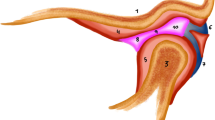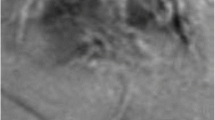Abstract
Background
MRI manifestation of temporomandibular joint arthritis is frequently reported in children with juvenile idiopathic arthritis. However, little attention has been paid to temporomandibular joint disk abnormalities.
Objective
To assess combinations of MRI findings in the symptomatic temporomandibular joint in children with juvenile idiopathic arthritis with focus on disk abnormalities.
Materials and methods
This was a retrospective study of 46 patients with juvenile idiopathic arthritis, mean age 12 years (range: 5-17 years). Mean disease duration was 70 months (standard deviation: 61 months). MR images of 92 temporomandibular joints were scored for thickness of abnormally enhancing synovium (synovitis), joint effusion, bone marrow oedema, abnormal bone shape, bone erosion and disk abnormalities.
Results
The 92 temporomandibular joints were categorized as A: No synovitis and normal bone shape (30/92; 33%), B: Synovitis and normal bone shape (14/92: 15%), C: Synovitis and abnormal bone shape (38/92; 41%) and D: No synovitis but abnormal bone shape (10/92; 11%). Thirty-six of the 46 patients (78%) had synovitis and 33/46 (72%) had abnormal bone shape, most frequently in combination (30/46; 65%). Disk abnormalities (flat disk, fragmented disk, adherent disk and displaced disk) were found in 29/46 patients (63%). Disk abnormalities were found in all categories of juvenile idiopathic arthritis involved temporomandibular joints (B: 8/14 [57%]; C: 25/38 [66%] and D: 7/10 [70%]). Disk displacement was found in half of the joints (7/14) in category B. Synovitis was most pronounced in this category.
Conclusion
Disk abnormalities were frequent. Disk displacement also occurred in joints with early temporomandibular joint arthritis, i.e., with normal bone shape. Other disk abnormalities were found in joints with bone abnormalities. Attention should be paid to disk abnormalities both in early and long-standing temporomandibular joint arthritis in children with juvenile idiopathic arthritis.





Similar content being viewed by others
References
Berntson L, Andersson Gäre B, Fasth A et al (2003) Incidence of juvenile idiopathic arthritis in the Nordic countries. A population based study with special reference to the validity of the ILAR and EULAR criteria. J Rheumatol 30:2275–2282
Riise ØR, Handeland KS, Cvancarova M et al (2008) Incidence and characteristics of arthritis in Norwegian children: a population-based study. Pediatrics 121:e299–e306
Moe N, Rygg M (1998) Epidemiology of juvenile chronic arthritis in northern Norway: a ten-year retrospective study. Clin Exp Rheumatol 16:99–101
Ravelli A, Martini A (2007) Juvenile idiopathic arthritis. Lancet (Lond) 369:767–778
Arvidsson L, Smith H-J, Flatø B et al (2010) Temporomandibular joint findings in adults with long-standing juvenile idiopathic arthritis: CT and MR imaging assessment. Radiology 256:191–200
Larheim TA, Smith HJ, Aspestrand F (1990) Rheumatic disease of the temporomandibular joint: MR imaging and tomographic manifestations. Radiology 175:527–531
Smith HJ, Larheim TA, Aspestrand F (1992) Rheumatic and nonrheumatic disease in the temporomandibular joint: gadolinium-enhanced MR imaging. Radiology 185:229–234
Damasio MB, Malattia C, Martini A et al (2010) Synovial and inflammatory diseases in childhood: role of new imaging modalities in the assessment of patients with juvenile idiopathic arthritis. Pediatr Radiol 40:985–998
Abramowicz S, Cheon J-E, Kim S et al (2011) Magnetic resonance imaging of temporomandibular joints in children with arthritis. J Oral Maxillofac Surg 69:2321–2328
Stoll M, Sharpe T, Beukelman T et al (2012) Risk factors for temporomandibular joint arthritis in children with juvenile idiopathic arthritis. J Rheumatol 39:1880–1887
Koos B, Twilt M, Kyank U et al (2014) Reliability of clinical symptoms in diagnosing temporomandibular joint arthritis in juvenile idiopathic arthritis. J Rheumatol 41:1871–1877
Vaid Y, Dunnavant FD, Royal S et al (2014) Imaging of the temporomandibular joint in juvenile idiopathic arthritis. Arthritis Care Res 66:47–54
Meyers A, Laor T (2013) Magnetic resonance imaging of the temporomandibular joint in children with juvenile idiopathic arthritis. Pediatr Radiol 43:1632–1641
Tzaribachev N, Fritz J, Horger M (2009) Spectrum of magnetic resonance imaging appearances of juvenile temporomandibular joints (TMJ) in non-rheumatic children. Acta Radiol 50:1182–1186
von Kalle T, Winkler P, Stuber T (2013) Contrast-enhanced MRI of normal temporomandibular joints in children--is there enhancement or not? Rheumatology 52:363–367
Kottke R, Saurenmann RK, Schneider MM et al (2014) Contrast-enhanced MRI of the temporomandibular joint: findings in children without juvenile idiopathic arthritis. Acta Radiol 59:1145–1152
Cahill AM, Baskin KM, Kaye RD et al (2007) CT-guided percutaneous steroid injection for management of inflammatory arthropathy of the temporomandibular joint in children. AJR Am J Roentgenol 188:182–186
Kuseler A, Pedersen TK, Herlin T et al (1998) Contrast enhanced magnetic resonance imaging as a method to diagnose early inflammatory changes in the temporomandibular joint in children with juvenile chronic arthritis. J Rheumatol 25:1406–1412
Weiss PF, Arabshahi B, Johnson A et al (2008) High prevalence of temporomandibular joint arthritis at disease onset in children with juvenile idiopathic arthritis, as detected by magnetic resonance imaging but not by ultrasound. Arthritis Rheum 58:1189–1196
Müller L, Kellenberger CJ, Cannizzaro E et al (2009) Early diagnosis of temporomandibular joint involvement in juvenile idiopathic arthritis: a pilot study comparing clinical examination and ultrasound to magnetic resonance imaging. Rheumatology 48:680–685
Argyropoulou MI, Margariti PN, Karali A et al (2009) Temporomandibular joint involvement in juvenile idiopathic arthritis: clinical predictors of magnetic resonance imaging signs. Eur Radiol 19:693–700
Cannizzaro E, Schroeder S, Muller LM et al (2011) Temporomandibular joint involvement in children with juvenile idiopathic arthritis. J Rheumatol 38:510–515
Taylor DB, Babyn P, Blaser S et al (1993) MR evaluation of the temporomandibular joint in juvenile rheumatoid arthritis. J Comput Assist Tomogr 17:449–454
Petty R, Southwood T, Manners P et al (2004) International League of Associations for Rheumatology classification of juvenile idiopathic arthritis: second revision, Edmonton, 2001. J Rheumatol 31:390–392
Giannini EH, Ruperto N, Ravelli A et al (1997) Preliminary definition of improvement in juvenile arthritis. Arthritis Rheum 40:1202–1209
Brooks SL, Westesson PL, Eriksson L et al (1992) Prevalence of osseous changes in the temporomandibular joint of asymptomatic persons without internal derangement. Oral Surg Oral Med Oral Pathol 73:118–122
Karlo CA, Stolzmann P, Habernig S et al (2010) Size, shape and age-related changes of the mandibular condyle during childhood. Eur Radiol 20:2512–2517
Yale SH, Allison BD, Hauptfuehrer JD (1966) An epidemiological assessment of mandibular condyle morphology. Oral Surg Oral Med Oral Pathol 21:169–177
Larheim TA (1981) Radiographic appearance of the normal temporomandibular joint in newborns and small children. Acta Radiol Diagn 22:593–599
Yamada M, Matsuzaka T, Uetani M et al (1995) Normal age-related conversion of bone marrow in the mandible: MR imaging findings. AJR Am J Roentgenol 165:1223–1228
Morimoto Y, Tominaga K, Konoo T et al (2004) Detection and significance of the characteristic magnetic resonance signals of mandibular condyles in children. Oral Surg Oral Med Oral Pathol Oral Radiol Endod 97:269–275
Lei J, Liu MQ, Yap AU et al (2013) Condylar subchondral formation of cortical bone in adolescents and young adults. Br J Oral Maxillofac Surg 51:63–68
Morimoto Y, Konoo T, Tominaga K et al (2007) Relationship between cortical bone formation on mandibular condyles and alternation of the magnetic resonance signals characteristic of growth. Am J Orthod Dentofacial Orthop 131:473–480
Drace JE, Enzmann DR (1990) Defining the normal temporomandibular joint: closed-, partially open-, and open-mouth MR imaging of asymptomatic subjects. Radiology 177:67–71
Larheim TA, Westesson P, Sano T (2001) Temporomandibular joint disk displacement: comparison in asymptomatic volunteers and patients. Radiology 218:428–432
Larheim TA, Katzberg RW, Westesson PL et al (2001) MR evidence of temporomandibular joint fluid and condyle marrow alterations: occurrence in asymptomatic volunteers and symptomatic patients. Int J Oral Maxillofac Surg 30:113–117
Østergaard M, Peterfy C, Conaghan P et al (2003) OMERACT Rheumatoid Arthritis Magnetic Resonance Imaging Studies. Core set of MRI acquisitions, joint pathology definitions, and the OMERACT RA-MRI scoring system. J Rheumatol 30:1385–1386
Larheim TA, Smith HJ, Aspestrand F (1991) Rheumatic disease of temporomandibular joint with development of anterior disk displacement as revealed by magnetic resonance imaging. A case report. Oral Surg Oral Med Oral Pathol 71:246–249
Arabshahi B, Cron RQ (2006) Temporomandibular joint arthritis in juvenile idiopathic arthritis: the forgotten joint. Curr Opin Rheumatol 18:490–495
Ringold S, Cron RQ (2009) The temporomandibular joint in juvenile idiopathic arthritis: frequently used and frequently arthritic. Pediatr Rheumatol Online J 7:11
Tominaga K, Konoo T, Morimoto Y et al (2007) Changes in temporomandibular disc position during growth in young Japanese. Dentomaxillofac Radiol 36:397–401
Suenaga S, Hamamoto S, Kawano K et al (1996) Dynamic MR imaging of the temporomandibular joint in patients with arthrosis: relationship between contrast enhancement of the posterior disk attachment and joint pain. AJR Am J Roentgenol 166:1475–1481
Farina D, Bodin C, Gandolfi S et al (2009) TMJ disorders and pain: assessment by contrast-enhanced MRI. Eur J Radiol 70:25–30
Kuseler A, Pedersen T, Gelineck J et al (2005) A 2 year followup study of enhanced magnetic resonance imaging and clinical examination of the temporomandibular joint in children with juvenile idiopathic arthritis. J Rheumatol 32:162–169
Alkhader M, Ohbayashi N, Tetsumura A et al (2010) Diagnostic performance of magnetic resonance imaging for detecting osseous abnormalities of the temporomandibular joint and its correlation with cone beam computed tomography. Dentomaxillofac Radiol 39:270–276
Author information
Authors and Affiliations
Corresponding author
Ethics declarations
Conflicts of interest
None
Rights and permissions
About this article
Cite this article
Kirkhus, E., Arvidsson, L.Z., Smith, HJ. et al. Disk abnormality coexists with any degree of synovial and osseous abnormality in the temporomandibular joints of children with juvenile idiopathic arthritis. Pediatr Radiol 46, 331–341 (2016). https://doi.org/10.1007/s00247-015-3493-7
Received:
Revised:
Accepted:
Published:
Issue Date:
DOI: https://doi.org/10.1007/s00247-015-3493-7




